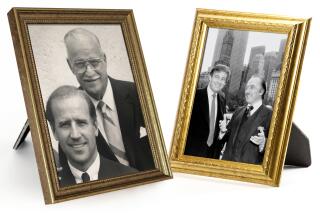U.S. Successions Began With George (III and W)
- Share via
NEW HAVEN, CONN. — Our story of father-son succession and the U.S. presidency begins with George the elder and George W the younger--that is, with King George III and George Washington.
As the federal Constitution was being debated in the late 1780s, everyone understood that Washington would most likely become the United States’ first president. But America’s George would be very different from Britain’s George. As Federalist 69 emphasized: “The president of the United States would be an officer elected by the people for four years; the king of Great Britain is a perpetual and hereditary prince.” The U.S. Constitution thus decisively broke with the idea that political office should be handed down from father to son as inheritable property. In Thomas Jefferson’s words, “The mass of mankind has not been born with saddles on their backs, nor a favored few booted and spurred, ready to ride them legitimately, by the grace of God.”
Sadly, the Constitution in practice failed to live up to this lofty idea of a republic open to talent and indifferent to blood. Plantation owners’ namesakes were given spurs at birth, and slave children were saddled up. But the Constitution’s language proclaimed a different, antidynastic ideal. Here, “We the people” would live out “a republican form of government” based on principles of equal citizenship. In two separate places, the Constitution promised no “titles of nobility” would be allowed in America. A third clause condemning titles of nobility passed Congress as a constitutional amendment in the early 19th century but was never ratified.
George W’s unanimous election in 1789--every member of the first electoral college supported him--reflected the founders’ strong suspicion of father-son dynasty. Put simply, Washington became father of his country in part because he was not father of his own children. He sired no heirs, and his only stepson died in 1781. Americans could breathe easier knowing their first general and first president would not try to create a throne and crown to pass on to his namesake. In fact, the man contemporaries most feared was Alexander Hamilton, who often played the role of the son Washington never had.
The history of the early presidency is striking. Thomas Jefferson had no surviving sons, at least no legitimate ones. Ditto for James Madison and James Monroe. John Adams, however, did have a son and namesake: John Q. Q’s eventual accession to the presidency can be seen as a transition from a premodern world of dynastic succession to the modern world of a democracy open to talent. As historian Gordon Wood explained, pre-Revolutionary America was a world of political patriarchy: “During the half century before the Revolution, more than 70% of the representatives elected to the New Jersey assembly were related to previously elected legislators.”
Q’s accession in 1824 might seem a throwback, but it can also be viewed differently. A Phi Beta Kappa graduate of Harvard and, later, a Harvard professor; an accomplished diplomat, fluent in several languages, with decades of experience in foreign affairs, including a successful eight-year stint as secretary of state--here was a man with impressive credentials and prodigious talents in his own right. And Q’s entrance onto the presidential stage occurred a quarter-century after his father’s exit. In 1801, when John the elder left office, Q was not old enough to run--one happy effect, and perhaps purpose, of the Constitution’s rule requiring the president to be at least 35 was to limit regency successions of young and irresponsible namesakes.
Having considered presidential Georges and Johns from the founding, let’s now turn to our modern presidential Georges and Johns. John F. Kennedy’s electoral victory in 1960 did pose genuine concerns about dynastic succession--mainly issues of brother-brother rather than father-son succession. Had Robert F. Kennedy or Sen. Edward M. Kennedy become president soon after their elder brother, the world might well have wondered if American democracy were really so different from old-fashioned monarchy and feudalism. And perhaps John F. Kennedy Jr.’s greatest service to the nation was that he did not try to claim the Camelot crown wrested from his father.
If these last points seem overwrought, consider how the rest of the world is still struggling to break free from dynastic succession. Recent years have witnessed father-son transitions in North Korea, Jordan and Morocco; both Iraq and Syria may soon follow suit. The new vice president and heir apparent in Indonesia is the daughter of a former president; and the leader of the Congress Party in India, Sonia Gandhi, is the widow of one prime minister (Rajiv Gandhi), the daughter-in-law of another prime minister (Indira Gandhi) and the granddaughter-in-law of yet a third prime minister (Jawaharlal Nehru). In turn, Sonia’s daughter, Priyanka, is beginning to build a political following. These familial successions are unfortunate throwbacks to feudalism, even in societies that have elected their leaders “democratically.”
Through their names and their looks, the offspring of great leaders doubtless conjure up images of past glory in the minds of fellow citizens; but a mature democracy should insist that look-alikes and sound-alikes are truly persons of distinction in their own right before crowning them with high office. The history of great families is, alas, often a history of decline.
All this raises questions about our George W. One real cost of electing this namesake to the presidency would be the mixed message about democracy and dynasty it might send to the rest of the world. Granted, dynasty has some virtues: In India, Indonesia and Pakistan, for example, it has crowned women as leaders of societies otherwise stained by rather repressive policies toward those born with two X chromosomes. Granted, also, Americans must be free to vote for the best person and should not bar someone who happens to be a president’s heir. Rather than a “title of nobility,” an absolute bar would resemble an unconstitutional “corruption of the blood” imposed on children of unfavored politicians.
But we should proceed carefully here, lest we open a Pandora’s box the founders tried to nail shut by electing their George W. Here are a few suggested guidelines: First, American voters should distinguish between political dynasties and presidential ones. Gubernatorial, senatorial and other dynasties abound, but the stakes and visibility of the presidency make it different in kind. Second, let’s focus on the time lapse between the elder’s exit and the younger’s entrance; dynastic dangers are greatest when these two are close together. (In addition to the Adamses, note that Benjamin Harrison was elected 48 years after his grandfather William Henry, who died after a month in office, and Franklin D. Roosevelt entered office 24 years after his distant cousin, Theodore Roosevelt, had left.)
Third, pay extra attention to the credentials and talents of the younger in his own right and don’t assume his upbringing has properly trained him for office by osmosis. Be especially wary when the younger shares the elder’s first name as well as his last name: It’s disheartening when some pundits speculate that George W.’s early success in polls reflected confusion between pere and fils. The presidency should not go to whomever first grabs the domain name abelincoln.gov.
None of this means George W. should not be our next president. It does mean he deserves special scrutiny because his accession would raise special concerns about presidential primogeniture. And let’s not forget about W.’s politically active brother, Florida Gov. Jeb Bush. On the other hand, at least George W. does not have any sons named George III. *
More to Read
Sign up for Essential California
The most important California stories and recommendations in your inbox every morning.
You may occasionally receive promotional content from the Los Angeles Times.













